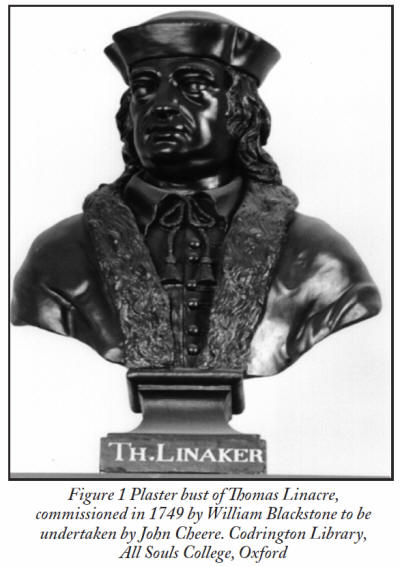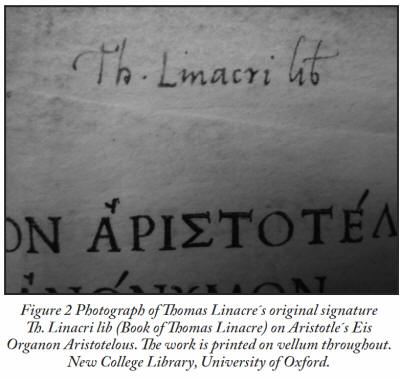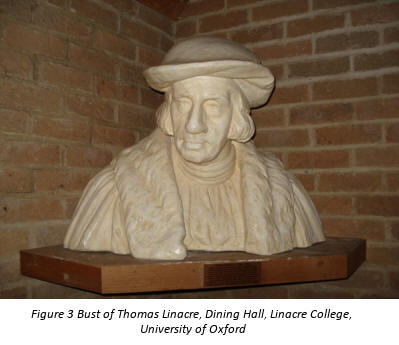Catholic Medical Quarterly Volume 67(3) August 2017
Great Medical Lives
Thomas Linacre:
Humanist, Scholar, Physician and Priest
Pia Jolliffe
 Thomas
Linacre was born in 1460 and died in 1524. He served as physician to the
King and founded the Royal College of Physicians. Before that he entered
All Souls College, Oxford, in 1480; he was elected a Fellow in 1484 and
later took a Master of Arts degree. By 1484 he must have been quite
advanced in the study of arts as the college statutes required Fellows to
have spent at least three years in Oxford before admission.
Thomas
Linacre was born in 1460 and died in 1524. He served as physician to the
King and founded the Royal College of Physicians. Before that he entered
All Souls College, Oxford, in 1480; he was elected a Fellow in 1484 and
later took a Master of Arts degree. By 1484 he must have been quite
advanced in the study of arts as the college statutes required Fellows to
have spent at least three years in Oxford before admission.
During these years Linacre may have become interested in medicine as several Fellows who preceded him at All Souls were medical doctors: Stephen Barworth, who was admitted in 1450, Nicholas Halswell, admitted in 1468 and John Racour, admitted in 1467. All this suggests a lively medical tradition at All Souls College before, during and after Linacre´s college fellowship. Linacre continued to be a Fellow of All Souls College during his ten years in Italy, when he studied Medicine at Vicenza and obtained an M.D. degree in Padua.
He returned to England by 1499 and started to give lectures, presumably in London, which Thomas More attended. He was closely connected with the Royal Court and served as physician to King Henry VIII; he treated Cardinal Wolsey, the King’s first minister, and others. At the same time, it was important for Linacre to remain connected to the academic world through both his medical work and study of Latin[1].
Linacre’s
scholarly publications include a work on Latin composition, De
emendata structura Latini sermonis (On the Correct Structure of Latin
Language ), which was published in London in 1524 and reprinted many times
in Continental Europe. Linacre also translated Galen’s medical treaties
from Greek to Latin. These include: De sanitate tuenda (On Health
Care); Methodus medendi (Healing Methods); De temperamentis
and De inaequali intemperie (On the Right Admixture and On
Unequal Want of Moderation); De naturalibus facultatibus (On
Natural Faculties); De usu pulsuum (On the Use of Pulse); De
symptomatum differentiis (On Different Symptoms), and De
symptomatum causis (On the Causes of Symptoms). Linacre´s own library
included classical texts, such as Eis Organon Aristotelous which literally
means the tool or instrument of Aristotle (see fig. 2).
In 1518 Linacre with Cardinal Wolsey and five other physicians successfully petitioned Henry VIII for the establishment of a Royal College of Physicians to grant licenses to those medical doctors qualified to practice within the city of London and the surrounding area, up to a 7 mile limit. In 1520 Linacre resigned as King’s physician to become a Roman Catholic priest. He received his first priestly orders as rector of Wigan in 1520.
In sum, Linacre was a medical doctor, a humanistic and classical scholar, and a Roman Catholic priest. He was a great – perhaps saintly – Renaissance man, of scientific, classical and theological expertise.
James J. Walsh suggests that Linacre's strong religious ties preceded his call to the priesthood: "Dr. Linacre, who besides being the best known physician of his time in England, was the greatest scholar of the English Renaissance period. Yet he had all his life been on very intimate terms with the ecclesiastical authorities and eventually gave up his honours, his fortune, and his profession to become a simple priest of the old English Church" (2).
 Linacre's four-year priesthood was a time of active service: "He was
ordained either by Archbishop Warham of Canterbury, or by Cardinal Wolsey,
the Archbishop of York. He received his first appointment from Warham by
whom he was placed in the rectory of Mersham in Kent. After a month he was
installed as an ordinary canon in the Cathedral of Wells, and admitted to
the Church of Hawkhurst in Kent which he held until the year of his
death." (2). He endowed part of his fortune from eleven years of medical
practice to found readerships in Greek medicine at Merton College, Oxford
and St John’s College, Cambridge. These endowments were possible thanks to
Linacre´s efforts to acquire land with the proceeds of his medical
practice. Before that in 1515, Linacre had passed certain lands on to
Thomas More, and others, possibly with the idea they would act as
executors of a large scale endowment.(1) Thomas More indeed appeared later
as one of the executors of Linacre´s last Will.
Linacre's four-year priesthood was a time of active service: "He was
ordained either by Archbishop Warham of Canterbury, or by Cardinal Wolsey,
the Archbishop of York. He received his first appointment from Warham by
whom he was placed in the rectory of Mersham in Kent. After a month he was
installed as an ordinary canon in the Cathedral of Wells, and admitted to
the Church of Hawkhurst in Kent which he held until the year of his
death." (2). He endowed part of his fortune from eleven years of medical
practice to found readerships in Greek medicine at Merton College, Oxford
and St John’s College, Cambridge. These endowments were possible thanks to
Linacre´s efforts to acquire land with the proceeds of his medical
practice. Before that in 1515, Linacre had passed certain lands on to
Thomas More, and others, possibly with the idea they would act as
executors of a large scale endowment.(1) Thomas More indeed appeared later
as one of the executors of Linacre´s last Will.
After Linacre´s death in 1524, another of his executors, John Clement, kept his personal library. Like Linacre, Clement was a Roman Catholic physician. He was also tutor to Thomas More´s children. However, under Queen Elizabeth I, Clement went with the rest of Thomas More´s household into exile in Flanders. Presumably they took some of Linacre´s books with them. These were dispersed after the English sacking of the city of Mechelen in 1572 and again in 1580. The remaining books testify Linacre's interests in Greek philosophy, history, and medicine, as well as in patristic theology.(3)
This translation from Greek to English was very kindly provided by the
author´s brother-in-law,
John Jolliffe.
All translations from Latin to English by the author, Pia Jolliffe
Acknowledgements
In researching and writing this article I received support from:
Fra´
John Eidinow (Fellow and Tutor in Classics, St Benet´s),
Dr Anne Keene and
Fiona Richardson (both of Linacre College, University of Oxford),
Gaye
Morgan (Codrington Library, All Souls College, University of Oxford),
Naomi van Loo and Jason Morgan (New College Library, University of
Oxford),
from Dr Julia Walworth (Fellow Liberian, Merton College,
University of Oxford),
my brother-in-law John Jolliffe and my husband
William Jolliffe.
The documents and images printed in this paper are
reproduced by kind permission of the The Warden and Fellows of All Souls
College, Oxford and The Warden and Scholars of New College, Oxford.
BT1.3.5, t.p
References
- Fletcher JM. Linacre´s Lands and Lectureships
In: Maddison F, Pelling M, Webster C, editors. Essays on the life and work of Thomas Linacre, c. 1460-1524 Oxford Eng.: Clarendon Press; 1977. p. 107-197. - Walsh JJ. Catholic churchmen in science; sketches of the lives of Catholic ecclesiastics who were among the great founders in science. 1st-3d ser.]. Philadelphia: American ecclesiastical review; 1906.
- Nutton V. Linacre, Thomas (c.1460–1524). Oxford Dictionary of
National Biography, Oxford University Press; 2004; online edn, Oct
2008
[http://ezproxy-prd.bodleian.ox.ac.uk:2167/view/article/16667, accessed 15 Feb 2017]
Dr Pia Jolliffe, is a Visiting Research Fellow at the
Oxford
Institute of Population Ageing., University of Oxford
